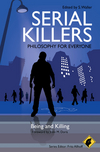Serial Killers: Being and Killing: Philosophy for Everyone
 Serial Killers - Philosophy for Everyone: Being and KillingISBN: 978-1-4051-9963-6
Paperback
248 pages
October 2010, Wiley-Blackwell
This is a Print-on-Demand title. It will be printed specifically to fill your order. Please allow an additional 10-15 days delivery time. The book is not returnable.
Learn more about this book
|
|||||||
Serial Killers: Being and Killing: Philosophy for Everyone
“Battle not with monsters, lest ye become a monster, and if you gaze into the abyss, the abyss gazes also into you.”—Friedrich Nietzsche
The popularity of television shows such as Dexter confirms that we just can’t get enough of serial killers: their motivations, their biographies, their biopic films, and their Lifetime channel style based-on-a- true-story novelistic treatments. Their ability to terrify us causes the darkly lit areas of our imagination to spring to life, and tickle our more sadistic pleasure centers, and yet this is usually ignored in the pop culture atmosphere. The gruesome, horrifying acts of real-life and fictional serial killers hold a deep and disturbing lure.
Serial Killers: Being and Killing investigates our profound intrigue with serial-murderers. Authors from various academic fields, as well as true crime writers and police officers delve into the reasons behind their behavior, the strange and questionable idea that a serial killer can work for good (“Sympathy for the Devil: Can a Serial Killer Ever be Good?” and “Dexter's Dark World: The Serial Killer as Superhero”), and the endless fascination that “classic” serial killers hold: Ian Brady, Ted Bundy, John Wayne Gacy, Jeffrey Dahmer, Hannibal Lecter, Dexter, and the Zodiac killer (“The Allure of the Serial Killer”).
Drawing from contemporary theories in cognitive science, philosophy (Nietzsche), phenomenology (applied to the writings of the Zodiac killer in “Man is the Most Dangerous Animal of All: A Philosophical Gaze into the Writings of the Zodiac Killer”), law (“The Situation of the Jury: Attribution Bias in the Trials of Accused Serial Killers”), psychopathy (“It Puts the Lotion in the Basket: The Language of Psychopathy”), and real-life accounts (a chronicle of the disappearance of one of Ted Bundy's victims submitted by the organization Families and Friends of Missing Persons and Violent Crime Victims), the essays are a must-read for pop culture and crime investigation buffs.
The question of moral responsibility and blame are unavoidable when discussing the acts of serial killers. In essays such as “Are Psychopathic Serial Killers Evil? Are They Blameworthy for What They Do?” and “The Thread of Death, or The Compulsion to Kill,” these questions are vigorously debated.
The contributors provide an engaging account of the serial killers, and yet also provide a heartfelt and sobering look at the real-life dangers associated with their existence in society. The last essay, “A Solemn Afterword: A Message from the Victim's Network,” and the last entry, “A Timeline of Serial Killers,” both strike home in their ability to remind us of the stark, grisly horror that is at the heart of our dark attraction to serial killers.





